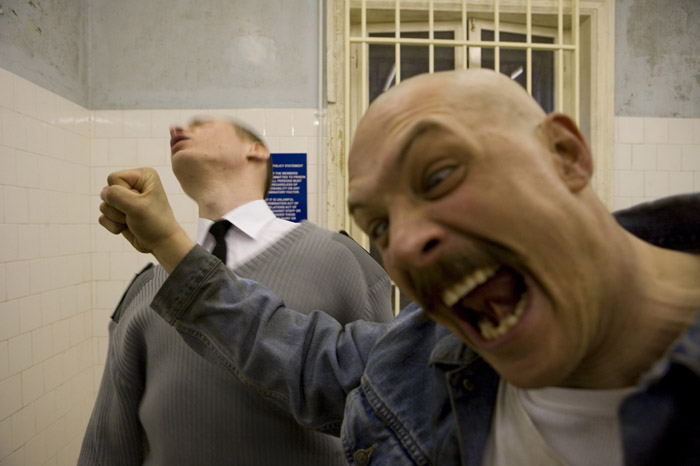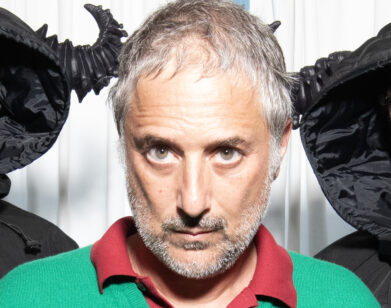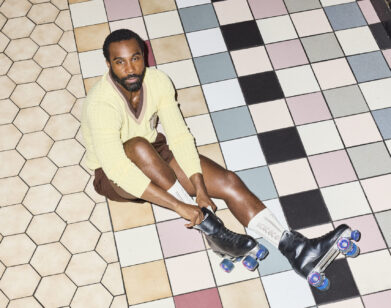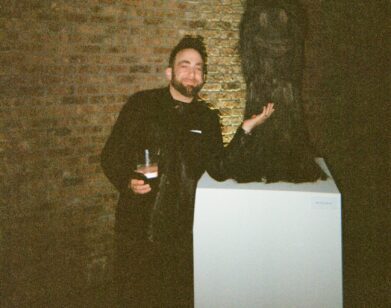Tough Guys

A fact-based character study of the infamous Michael Peterson (Tom Hardy)–known in the press as “most violent prisoner in Britain”–Bronson explores one man’s metamorphosis from a small time hood into a skull-crushing modern folk legend. It’s a breakout for film for Danish director Nicolas Winding Refn, whose Pusher trilogy offered an unflinching journey into Denmark’s drug underworld. (Next up: a Dr. Jekyll and Mr. Hyde adaptation starring Keanu Reeves.) Below, Refn discusses the influence of Hans Christian Andersen and filmmaker Kenneth Anger, and explains why violence in his films is “never funny.” (PHOTO: TOM HARDY IN BRONSON, COURTESY OF MAGNET RELEASING)
DARRELL HARTMAN: Did you know anything about Michael Petersen, a.k.a. Charlie Bronson, before you made this film?
NICOLAS WINDING REFN: I certainly didn’t. I really came about it by chance. The producer who’d been distributing my films in the UK called me up one day and said he’d just acquired the rights for a movie he’d been trying to make for many years. I got interested in it and decided to write it, because what had been written wasn’t very good. It was one of those lad films made by middle-class men for middle-class men. I had no interest in that.
HARTMAN: This movie is being compared to A Clockwork Orange. Thoughts?
REFN: It’s very kind. I don’t understand the comparison so much, but I could see why certain people would refer to it. I think it has to do with that kind of pop culture anti-authoritarian figure, and the violence and classical music. But the person I stole everything from to make the movie is Kenneth Anger. This is a combination of Scorpio Rising and Inauguration of the Pleasure Dome. It’s very basic visual poetry–and sexual ambiguity, homoeroticism, erotic violence.
HARTMAN: In both films, I think the classical music is establishing a link between art and violence.
REFN: To me, art is an act of violence. It violates. Physical violence destroys, but violence as an art form inspires.
HARTMAN: Towards the end of the film, Bronson tries drawing. It’s a funny scene. Does a guy like him have a capacity for mainstream forms of expression?
REFN: He’s not a good artist, but he realizes that art and violence are the same thing; now he knows why that instinct has always been there, and it makes him a happy person.
HARTMAN: Both Bronson and the Pusher trilogy are about survival in violent surroundings. And yet the aesthetics are so different.
REFN: The Pusher films are very much based on the authenticity of that world, shooting it like a documentary, adding that grittiness. But this movie needed to be operatic. The music is very operatic, larger than life.
HARTMAN: And in the Pusher world, the toughest guys get killed just like everyone else. In Bronson, the main character almost seems invincible.
REFN: Charlie Bronson sees himself as larger than life because he isn’t a person. He’s a character made up by Michael Petersen. He’s his own mythology.
HARTMAN: Tom Hardy’s performance is remarkable. How did you guys make that happen?
REFN: Tom is a great actor, first of all. He’s not afraid of himself and what he can potentially pull off, and I very much went on a journey with him to explore the different sides of this character. I never met Charlie Bronson and had no interest in meeting him, but I think Tom had gotten very friendly with him. In that sense, it was very much a collaboration between them. And Tom and I would talk about Hans Christian Andersen a lot, especially his tale about the little toy soldier that didn’t fit into the world.
HARTMAN: Psychologically speaking, this film doesn’t approach its main character in a traditional way.
REFN: The film is very much about a person who has no reason for his behavior other than what you read into it. There’s nothing that makes Michael Petersen choose this path; it was an evolution of many things. That’s why the film opens with a million interpretations. A biopic is about a person who achieves or does not achieve greatness, and why or why not that did not happen. Bronson didn’t achieve anything. He transformed himself.
HARTMAN: Your films are known for their violence. Does that make you uncomfortable?
REFN: My violence always has a negative consequence. It’s never funny. It’s always destructive, which is what real violence is.
HARTMAN: And movies about legendary criminals keep on coming: most recently, John Dillinger and Jacques Mesrine. Why do you think they’re so popular?
REFN: Well, Charlie isn’t a criminal. He’s never killed or shot or destroyed anybody. He robbed a post office when he was young and went to jail and decided he liked it there. But I think people like people who represent an alternative way to survive.
HARTMAN: You’ve got another film, Valhalla Rising, coming out early next year. What made you want to do a Viking story?
REFN: I don’t know. I think I wanted to make a science fiction movie, but I didn’t want it to be about the future and so technology-based. So I made a science fiction movie based in the 1100’s. It’s mental science fiction.
HARTMAN: You’ve said before that you really want to work in Hollywood.
REFN: Yeah, one of those movies with a lot of agents and executives running around on their BlackBerries. I’d love to see what it’s like.
HARTMAN: And now Universal has hired you to direct and adaptation of Dr. Jekyll and Mr. Hyde. What sort of budget are you working with?
REFN: It’s very expensive.
HARTMAN: And will there be lots of BlackBerries involved?
REFN: Hopefully.
Bronson opens October 9 at the Angelika Film Center.






